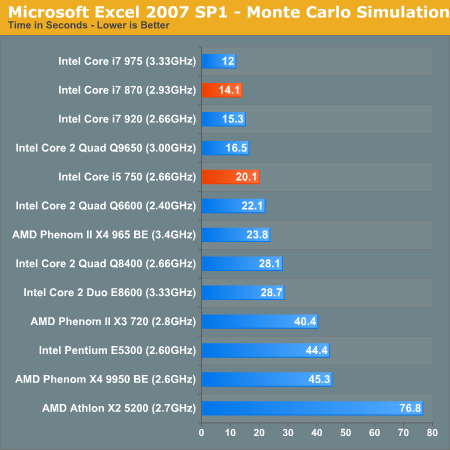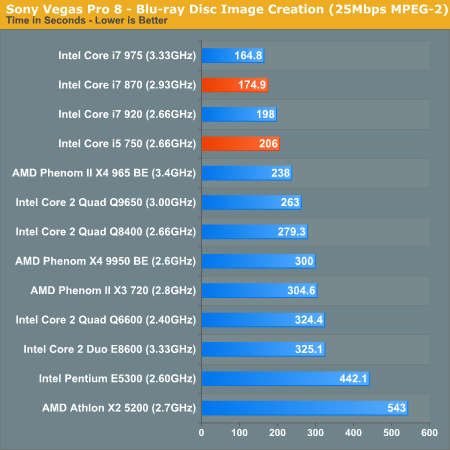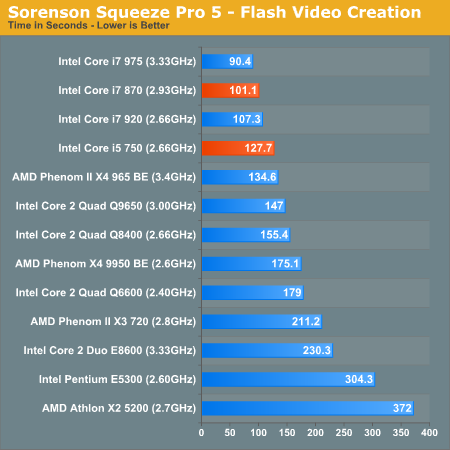Intel's Core i7 870 & i5 750, Lynnfield: Harder, Better, Faster Stronger
by Anand Lal Shimpi on September 8, 2009 12:00 AM EST- Posted in
- CPUs
Microsoft Excel 2007
Excel can be a very powerful mathematical tool. In this benchmark we're running a Monte Carlo simulation on a very large spreadsheet of stock pricing data.

The Excel test is peculiar in its results. It must be one of the few situations where Bloomfield's memory bandwidth advantage is seen as even the Core i7 870 can't outperform the i7 920. The Core 2 Quad Q9650 does well thanks to its large 12MB L2 cache, as does the Q6600 with a beefy 8MB cache.
Sony Vegas Pro 8: Blu-ray Disc Creation
Although technically a test simulating the creation of a Blu-ray disc, the majority of the time in our Sony Vegas Pro benchmark is spend encoding the 25Mbps MPEG-2 video stream and not actually creating the Blu-ray disc itself.

Hyper Threading is good for about 4% here, giving the 920 the slight edge over the Core i5 750.
Sorenson Squeeze: FLV Creation
Another video related benchmark, we're using Sorenson Squeeze to convert regular videos into Flash videos for use on websites.

The i5 750 pays the HT penalty, taking another 20 seconds to render our test video than the i7 920. It is still faster than the Phenom II X4 965 BE at a much lower cost. The Core i7 870 comes close but can't beat the i7 975.










343 Comments
View All Comments
maddoctor - Tuesday, September 8, 2009 - link
Yeah, I'm agree. I think AMD will be no more as a company next year. I hope it will be happen. I think it is better you throw your AMD rubbish products into the trash. Because, I don't see any valuable of it.Eeqmcsq - Tuesday, September 8, 2009 - link
Well, I hope that it does NOT happen, because we NEED competition to keep Intel honest. Secondly, I would not go as far as calling AMD stuff rubbish. They're good if they fit one's needs at the right price, but they are definitely getting pushed further down the totem pole.JonnyDough - Tuesday, September 8, 2009 - link
KEEP them honest? Where have you been?bupkus - Tuesday, September 8, 2009 - link
A Core i5 750 with HT would not only defeat the purpose of most of the i7s, but it would also widen the performance gap with AMD. Intel doesn't need to maintain a huge performance advantage, just one that's good enough.maddoctor - Tuesday, September 8, 2009 - link
I don't believe Intel will increasing its products because AMD does not have any competitive products.klatscho - Tuesday, September 8, 2009 - link
actually, they do - if you would care to have a look at price/performance, especially considering that amd has already quietly thinned out its portfolio to make room for price improvements in order to stay in the game.maddoctor - Tuesday, September 8, 2009 - link
Intel doesn't need to be honest. I hope Intel will lifts AMD licensee as AMD has been breached the Intel - AMD CLA. I believe Intel will always be innovating and makes more cheaper and performance wise products. AMD will be no more and you will not need to miss it, AMD had been doing its duty to made Intel more stronger and competitive.PrinceGaz - Tuesday, September 8, 2009 - link
You are a fool if you think AMD is no longer needed. The only reason these Lynnfield chips start at just $196 is because AMD is still here and were selling competitive chips at around that price point. No AMD means newer better chips are introduced at high price points and stay there for a long time, just look at Bloomfield's prices to see what happens when AMD offers no competition. The $284 i7 920 is for a slightly higher performing chip than any Phenom and is priced accordingly, but you have to pay $562 and then $999 for performance where there is truly no competition.No AMD would mean these Lynnfields starting at $284 if you're lucky (that's for something like the i5 750) with the HT enabled ones at the $562 price point, and the only chips you'd find for under $200 would be old Core 2 Duos and Quads. Thankfully AMD are here which is why new chips are introduced at competitive prices. No competition (from AMD) means no competitive prices, so if AMD go bust today, the next generation of Intel chips will start expensive, and stay expensive until they are replaced with the model after it, which won't be for a long time when nobody else can offer anything like their current product. I guess you don't remember the days of the original Pentium in the mid 90's.
ClagMaster - Tuesday, September 8, 2009 - link
I agree. We need AMD and it's foolish to assert otherwise.AMD has been very good to us over the last 10 years. If it was not for AMD, Intel would have a monopoly and we would have not have Lynnfield or Bloomfield today. Intel created Lynnfield because they wanted to be more competitive with AMD in the mainstream market. Bloomfield/X58 was simply too expensive for mainstream and AMD's Phenon II was a better value.
I am discouraged that people have so easily forgotten AMD's past leadership such as the efficient instruction schedulers, first on-chip memory controller,the first single-die dual and quad core chips to market, the first consumer 64-bit processors, the x86-64 architecture extension that Intel followed, and the K8 architecture that kicked Intel Netburst architecture's butt black and blue.
That's why Intel was motivated to drop Netburst and introduce the Core 2 Duo/P965 in 1996. Then adopt the aggressive tick-tock strategy ever since that has given us the 45nm Lynnfield today. Lynnfield has these AMD inspired innovations, and Intel has built upon these innovations with the on-die PCIe controller.
I have a lot of respect for AMD. Don't ever accuse AMD of not being innovative. AMD does not suffer from lack of technological innovation. They have demonstrated plenty of innovation. AMD suffers from lack of capital investment that allows acceleration of technological development and manufacturing infrastructure.
strikeback03 - Wednesday, September 9, 2009 - link
You can't really say Lynnfield is a response to PhenomII when it was on the Intel roadmap before they knew how PhenomII would perform or be priced. It is simply the next progression in their architecture. So you might be able to argue that Intel wouldn't have rolled out the Nehalem architecture as quickly without AMD, but you can't really say any one family is a response to another in that short a timescale.